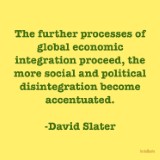The conflict of the concept globalization: intensification or 500 year process?
After all the discussion of globalization and how it affects the global south, one should wonder how long has the globalization process been into play. Some say it’s a 500 year process while others says it’s a 5000 year process, but Anthony Giddens is one who identifies globalization as, “the intensification of worldwide social relations which link distant localities in such way that local happenings are shaped by events occurring many miles away and vice versa”, thereby changing all aspects of our everyday life. Do you agree with Giddens’ stance? Or Thomas Klak for example who states that globalization is a 500 year process. According to Klak he stated that the term globalization gives the illusion of a “global village” to which all belong, but, in fact, the countries of Western Europe, North America, and Japan derive most of the benefits from prevailing global economic patterns, marginalizing the vast majority of humanity. Niche markets and global commodity chains today provide new details to economic exchange, but the end results duplicate the legacies of the exports of old — widening gaps in wealth and power between Core and Periphery. Yes! He said it! The complete opposite of what Giddens was saying right? Which side do you believe? Who do you choose? Do you believe that globalization is in fact a 500 yea process or is it what Giddens says it is? To add to Klak’s stance is Kelvin Singh who in his article said ” the process of globalization is not as new as current economic literature on the subject suggests. Rather it has been an ongoing process initiated five hundred years ago with the Portuguese discovery of the Cape of Good Hope route to India and Spanish discovery of the transatlantic route to Las Indias and the Americas.” again, who do you choose? Which of the definitions make sense to you? Is globalization really a 500 year process? When did it begin? Has it ended? Where are we in the process?
Thomas Klak, ed. Globalization and Neoliberalism: The Caribbean Context. Lanham, Md.: Rowman & Littlefield Publishers, 1998
Singh, K. (2002) Globalisation and the Caribbean: A Five Hundred-year Perspective. In Ramsaran, R. ed Caribbean Survival and the Global Challenge, Ian Randle Publishers, Kingston.
A.M.O



